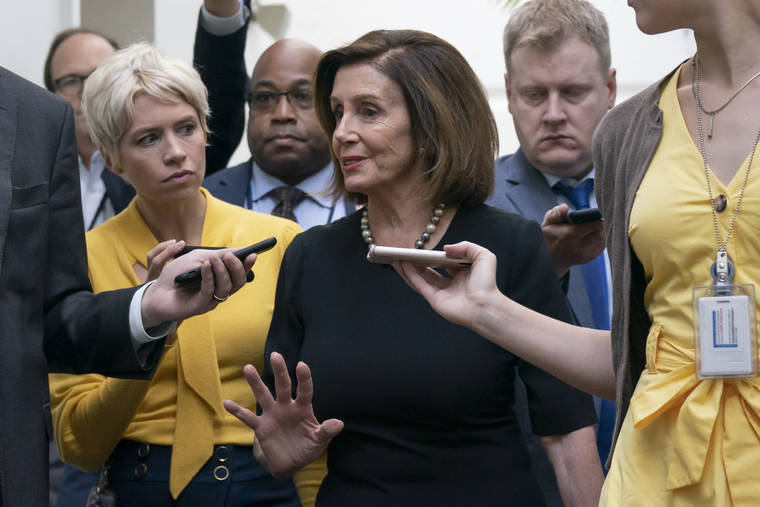WASHINGTON — Now that House Speaker Nancy Pelosi has launched an official impeachment inquiry of President Donald Trump, what’s next?
In some ways, the investigations of the Trump administration won’t look too different from those underway in the House, but now they’ll have a focus on the Ukraine situation and an urgency to act.
Pelosi embarked on the impeachment inquiry she had long resisted after an uproar from Democrats in Congress. It stemmed from a whistleblower’s complaint of Trump seeking help from the Ukraine president in digging up dirt on Democratic presidential candidate Joe Biden.
The Ukraine probe will take on a central focus, in part because House Democrats see it as a glaring example of wrongdoing and because they worry the allegation could foreshadow potential election interference in 2020 that echoes the Russian meddling of 2016.
Here’s a look at the next steps:
WHO’S IN CHARGE?
Pelosi has assembled the six House committees that were investigating the Trump administration for months under a new impeachment umbrella. The House Judiciary Committee, led by Rep. Jerrold Nadler, D-N.Y., is key because that panel would take the lead on drafting and considering any articles of impeachment that would be sent to the full House for a vote.
But the probe will also involve the work of other committees — Foreign Affairs, Financial Services, Intelligence, Oversight and Ways and Means — that have been looking into a range of Trump’s activities stemming from the president’s business dealings and administration, including former special counsel Robert Mueller’s report on Russian election interference in 2016.
While the committee chairmen have great independence over their workflow, Pelosi also keeps a close watch on operations. On Wednesday, she called them a “Steering Committee,” and she’s expected to check in with them regularly at her second-floor office in the Capitol.
———
HOW LONG WILL THIS TAKE?
The timeline remains a work in progress, but Pelosi told her colleagues she wants the House to “strike while the iron is hot.” She expects the inquiry to happen “expeditiously.”
That’s partly because Democrats believe, after months of trudging through the investigations of Trump, they have finally captured the public’s attention with the Ukraine case.
Some lawmakers say they expect votes on impeachment by year’s end, mindful of the coming 2020 elections. The first primary votes are scheduled in early February.
At the same time, lawmakers are set to leave town Friday for a two-week recess for the Jewish holy days, but some of the committees may continue to work even though Congress is not in session.
———
HOW DOES IMPEACHMENT WORK?
Impeachment is a multistep process, different but not entirely set apart from the way a bill becomes a law.
It largely starts with the Judiciary Committee drafting articles of impeachment, which would be debated and voted on by the panel and recommended to the full House.
The House would then consider the issue before voting on whether to send it to the Senate for a trial. With the Senate in Republican control, it’s highly doubtful any action there would conclude with a conviction.
For many House Democrats who came to support launching the inquiry in light of the Ukraine situation, the final outcome is not nearly as important as simply taking on their oversight role. They want to put Congress on record at a time when the president is testing the system of checks and balances.
Before any of that gets underway, there will almost certainly be more hearings, subpoenas and lawsuits as the committees call witnesses to testify and seek documents and information from the administration and others involved.
The White House has largely stonewalled Congress for the first half of this year, since Democrats took control of the House, declining to turn over documents and refusing to allow administration employees to testify in many of the investigations.
That may be changing now that the impeachment inquiry has started. The White House on Wednesday publicly released a rough transcript of the president’s call with Ukraine’s president and sent to the House and Senate intelligence committees a classified copy of the whistleblower’s complaint.
———
WHAT’S THE ISSUE HERE?
Democrats have been investigating Trump for months, but the Ukraine situation sparked new and deeper concerns about potential wrongdoing from the White House.
Trump has acknowledged he spoke with the president of Ukraine, Volodymyr Zelenskiy, on July 25, the day after Mueller testified before Congress, bringing his two-year probe to an end.
The call started as a congratulatory note to the new president of the Eastern European ally but quickly turned to Trump’s desire for the Ukraine government to investigate Biden.
Trump has sought to implicate the former Democratic vice president and his son Hunter Biden in the kind of corruption that has long plagued Ukraine. Hunter Biden served on the board of a Ukrainian gas company at the same time his father was leading the Obama administration’s diplomatic dealings with Kyiv. Although the timing raised concerns among anti-corruption advocates, there has been no evidence of wrongdoing by either the former vice president or his son.
In a rough transcript of the call released Wednesday by the administration, Trump tells Zelenskiy he would like the new president to “do us a favor.”
Trump has said he has done nothing wrong, characterizing the call as both “beautiful” and also “nothing.” Zelenskiy, standing alongside Trump at a press conference Wednesday at the United Nations, also suggested he didn’t want to get involved in U.S. politics, and “nobody pushed me.”
Pelosi and other Democrats in Congress say the transcript reads like a “shakedown” of a foreign leader by the American president.
———
A NOD TO HISTORY
Trump would join a rare group if the House moves forward toward impeachment. Only two presidents have been impeached: Andrew Johnson in 1868 and Bill Clinton in 1998. Both won acquittal in the Senate.
Richard Nixon, who faced impeachment proceedings, resigned from office in 1974.
———
Associated Press writer Mary Clare Jalonick contributed to the report.


